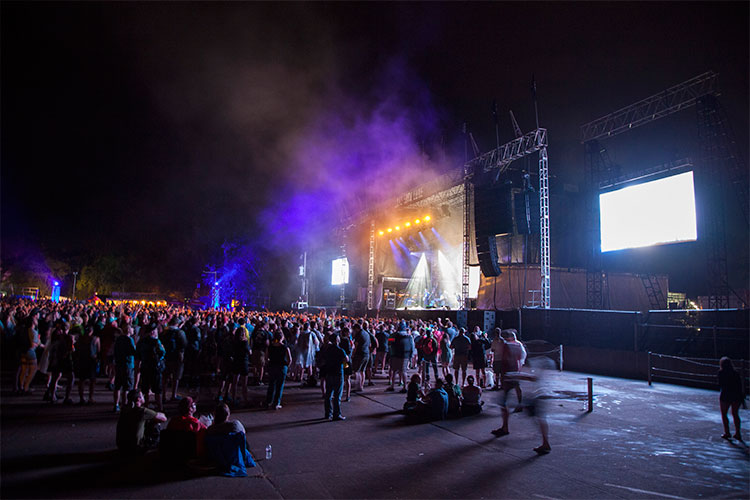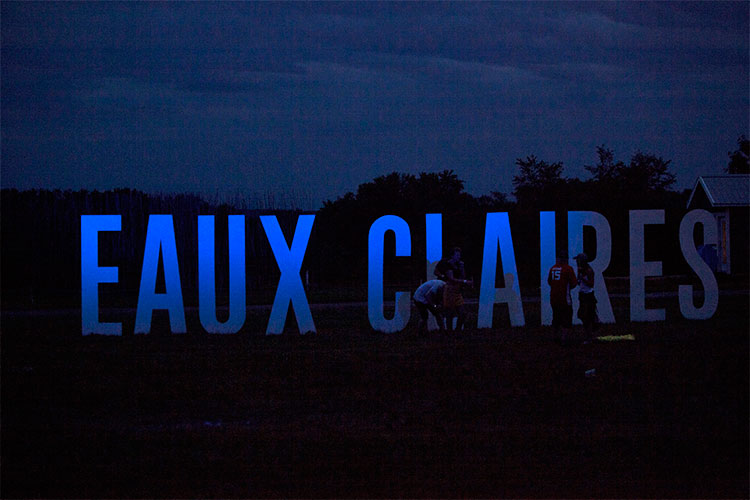When you throw a party as successful as the inaugural Eaux Claires festival, you risk setting unreasonable expectations for your next attempt. There’s pressure from all sides to replicate that success, to make something bigger and better year after year. Justin Vernon and Aaron Dessner, co-curators of Eaux Claires, have taken a very different approach from most festival organizers. Rather than build on a winning formula, they’ve sought to make things as different as possible each subsequent year while maintaining only the simple spirit of community and collaboration that the event was founded on. It’s almost as if they’ve deliberately tried to keep it small and discourage developing a brand.
Eaux Claires has occurred in a different month each year so far, and this third edition didn’t boast a proper Bon Iver performance nor anything related to The National. The artist roster shrank by nearly half, with the “upstairs” portion of the grounds out of commission due to noise complaints. On one hand, the headliners—Wilco, Paul Simon, and Chance The Rapper—were arguably the biggest names the festival has yet secured, but the rest of the lineup was a smattering of lesser-knowns and scene associates that was unlikely to draw huge numbers of new fans.
Spontaneity has always taken precedence over star power at Eaux Claires, though, and year three (Troix, as it was enduringly hashtagged) carried on in this tradition almost unavoidably, as bouts of harsh weather kept organizers and attendees on their toes throughout the weekend. More than ever before, it was the various unannounced performances and guests that made the weekend feel like such a unique thrill. A couple of small stages were designated as “EXC TBD” for basically the entire weekend, encouraging pop-up collaborative sets both planned and unplanned. Noting every surprise guest appearance and debut project would probably be impossible even for Vernon himself. Long before the Lollapaloozas and Bonnaroos became eclectic to a fault—and thus virtually indistinguishable from each other—they were known for their adventurousness, and for artists spontaneously working together onstage. Eaux Claires may be the last frontier for this pioneering spirit.
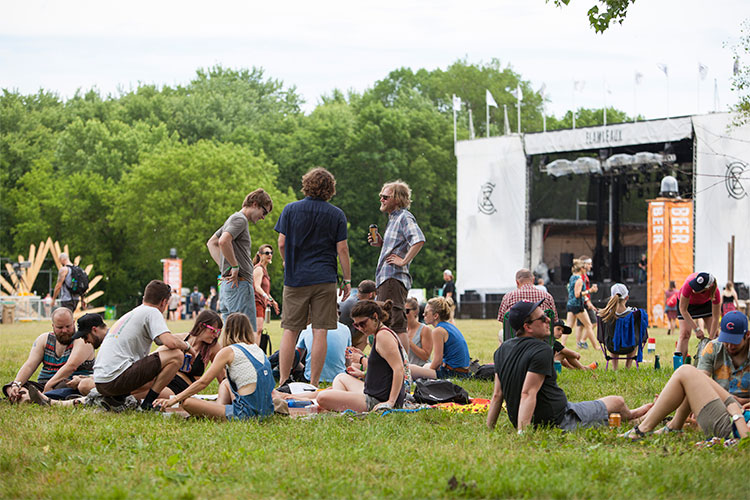
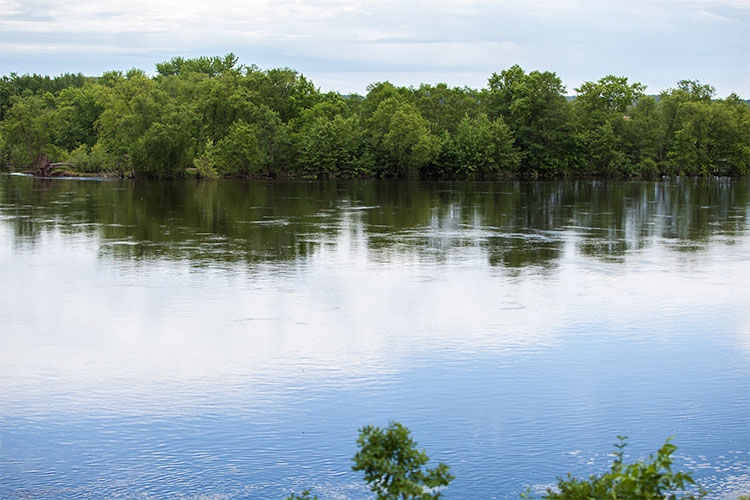
The festivities got underway Friday with a jam session called People Mixtape Vol. 1, which just happened to be Vernon and Dessner and an assortment of friends messing around for half an hour or so. (Added bonus for attendees: yet another dazzling stage design by Milwaukee’s own Kristina Rolander.) The two curators’ primary projects aren’t known for improvisation, and their core indie-rock fanbase isn’t likely to diversify into jam bands no matter how many Grateful Dead tunes they’re forced to listen to. Still, the crowd seemed enthused during the various experiments in improv throughout the weekend, even if they mostly stood stock still. Vol. 2 the following afternoon would be an even looser and more infectious set of seemingly pure improv; given the comings and goings of various musicians throughout the performance, the heights of intensity and smooth flow were astonishing. Don’t call it a superjam!
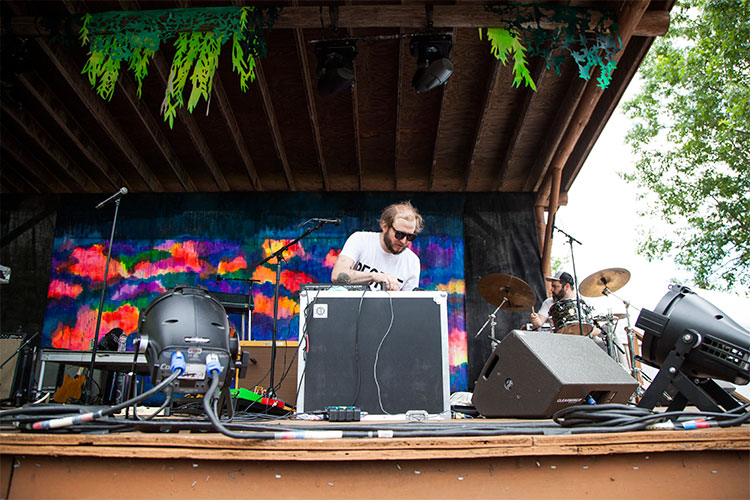
The midday heat perhaps wasn’t ideal for dancing, but it didn’t hamper Music For The Long Emergency one bit. This project was a collaboration between Minneapolis synth-pop band Poliça and European chamber group s-t-a-r-g-a-z-e, and it was enthralling, like a more upbeat and experimental Portishead. It would’ve been perfect for a long, 2 a.m. set at a festival far removed from noise ordinances. Truly, though, it’s amazing that sound systems like Eaux Claires’ are allowed to operate so close to a city at all; the bass from the weekend’s hip-hop sets felt like an earthquake at times, without ever sacrificing clarity. This occasionally proved problematic. There was no buffer zone between the main stages and the smaller ones as there had been in years past, and some performers in the wooded areas found themselves being drowned out by the primary acts. It’s difficult to imagine this situation improving without a significant expansion of the site.
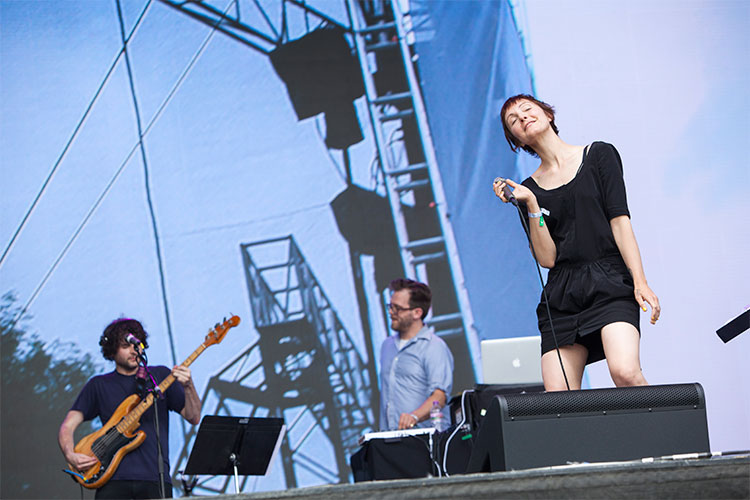
Reports suggested that the long-awaited reunion of Mountain Man suffered from sound bleed from Tweedy‘s main stage set; luckily, the folk trio would have another chance on Saturday. For its part, Tweedy, a.k.a. Wilco frontman Jeff Tweedy’s band with his son Spencer, wasn’t one of the more interesting Wilco side projects of the weekend, but the band did pull off a solid cover of Neil Young’s “The Losing End,” as well as the Pops Staples tune “Friendship,” featuring Vernon, Phil Cook, and Anaïs Mitchell. We also managed to catch Wilco guitarist Nels Cline‘s collaborative set with wife Yuka Honda under the moniker cup, which felt a lot like an eccentric couple rehearsing in their basement with no real goal in mind, except when Cline would really rip into his guitar and take the music to some truly otherworldly heights. Even more impressive was the debut of drummer Glenn Kotche‘s duo with Bon Iver collaborator and solo auteur S. Carey. We caught the tail end of this post-rock-ish groovefest and regretted missing the beginning.
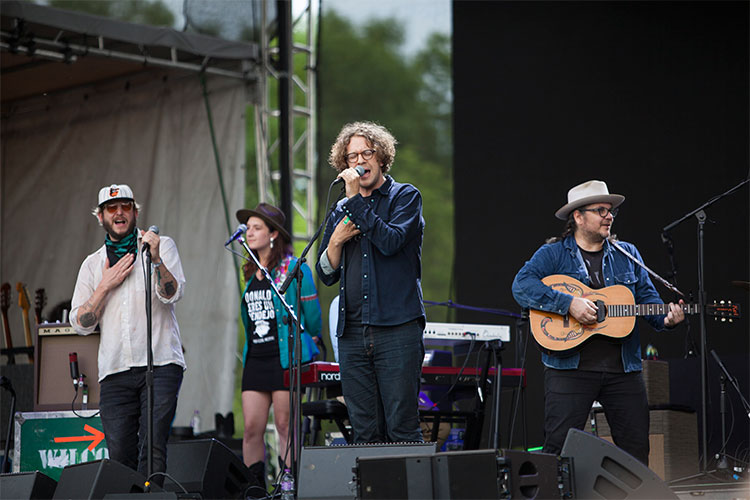
The best Wilco-related incident of Friday night came during the John Prine tribute set. Jeff Tweedy appeared onstage to sing Prine’s classic “Sam Stone,” pausing halfway through the song to welcome…Swamp Dogg? The funk/soul cult hero had previously covered “Sam Stone” on his 1972 album Cuffed, Collared & Tagged. Who knew he was still active on the performance circuit? He took his time with a heartfelt bit of spoken word around the song’s theme of forgotten military vets as the band shifted surprisingly smoothly from folk into a rudimentary R&B groove, surely one of the biggest surprises of the weekend. Also surprising: the fact that Prine himself didn’t emerge onstage until the last three songs of the set, by which time the rain was coming down pretty hard and many folks had fled to shelter. The set was fun and relaxed, showcasing some impressive honky-tonk finger-picking from guitarist Jeremy Ylvisaker (Alpha Consumer, Andrew Bird) and a slew of guests, but between banter and people shuffling on and off, they barely scratched the surface of Prine’s influential catalog.
Fortunately, Friday night was about to get a major burst of energy, as Sylvan Esso took the stage and owned it for an hour straight. Two years prior, the duo had been the most buzzed-about act of the secondary stages—now they are relative superstars of this particular scene, and the enthusiasm they provoked from the crowd was eclipsed only by the night’s climactic Chance The Rapper set.
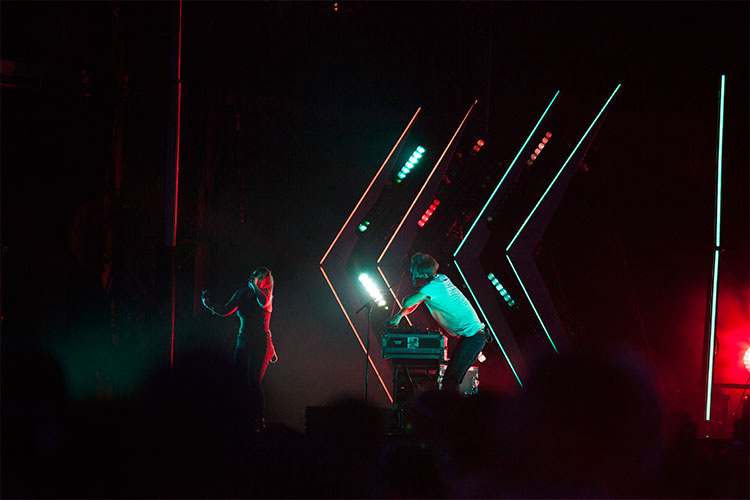
One of the fascinating elements of the Eau Claire scene’s orbit is how quickly rap has been incorporated into the community ever since Kanye West borrowed Bon Iver’s “Woods” for his 2010 track “Lost In The World.” Chance had made waves with his surprise festival-closing appearance with Francis And The Lights in 2016, so the Chicago rapper was probably this year’s least surprising lineup announcement. Aside from possibly the Bon Iver performance here in 2015, we’ve never witnessed such rapturous crowd response at this festival as the sea of fans enthralled with Chance’s performance. His set wasn’t about impressing anyone with his skills as an MC; he was more interested in letting his band (The Social Experiment) shine while testing the crowd’s legitimacy by digging deep into his catalog. Naturally, Francis and Vernon both emerged to reprise their “Friends” collaboration, and the sight of Vernon up there dancing like a dork had to be inspiring for even the dourest wallflowers at the fringes of the concert field.
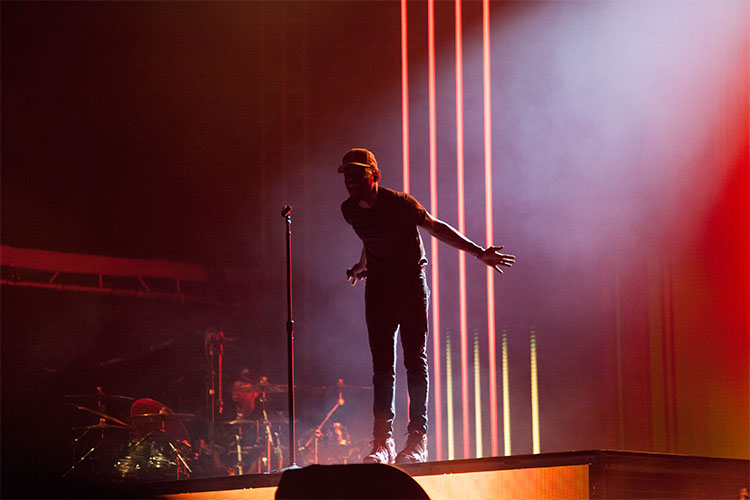
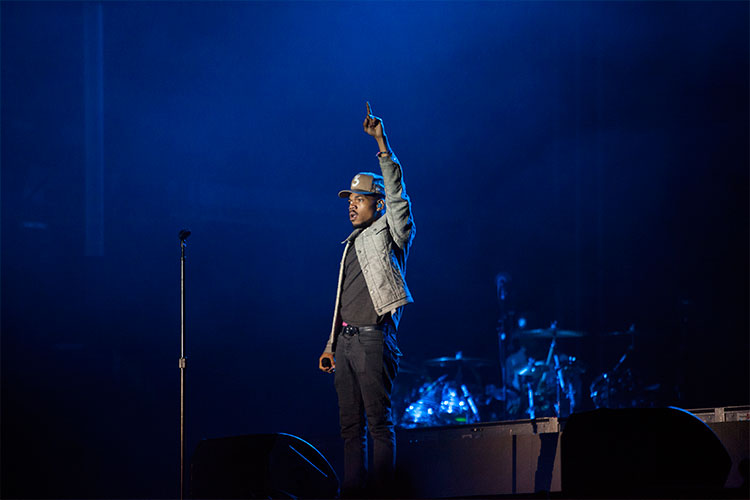
Eaux Claires Troix was pretty light on Milwaukee-based talent compared to previous years, although Saturday got off to a great start with the dramatically overhauled sound of Collections Of Colonies Of Bees. The trademark Chris Rosenau guitar sound still permeated the group’s experimental pieces, which were created specifically for performance at this festival, but new member Marielle Allschwang added much more to the group’s sound than just her distinctive voice. Throughout the set, she chopped and processed and looped her vocals until they were barely recognizable, sometimes to disorienting effect (similar to Thom Yorke’s techniques at the end of Radiohead’s “Everything In Its Right Place”), and sometimes in creation of hauntingly beautiful harmonic phrases and patterns.
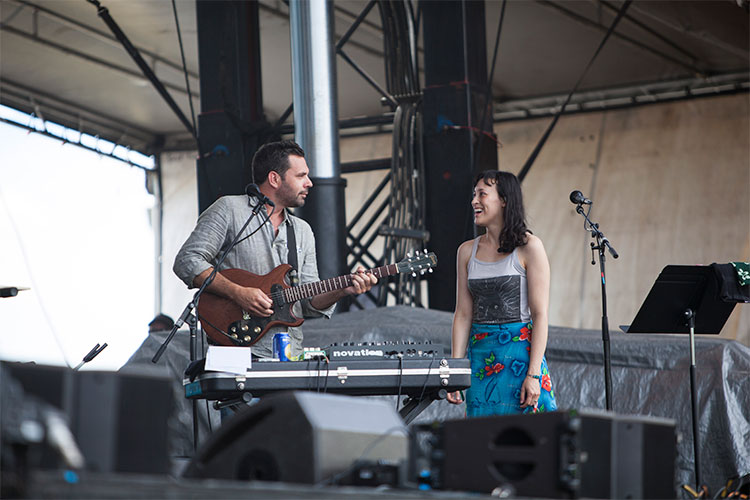
The set clearly turned some heads. Next up on the opposite main stage, the peculiar experience of fest-crashing Minneapolis rapper Astronautalis freestyling about CoCoBees backed by s-t-a-r-g-a-z-e gave the bewildered audience one of many odd moments that could not happen anywhere else. Another unexpected collaboration was Twin Cities “pow wow drum group” Midnite Express bookending Spank Rock‘s nonstop banger of a set. While Spank Rock himself may not be the most groundbreaking rapper around, his vocal talents and energy were on full display here, and DJ Delish proved to be as much of a focal point as the MC, even taking a moment to emerge from behind his equipment to show off some riveting dance moves.
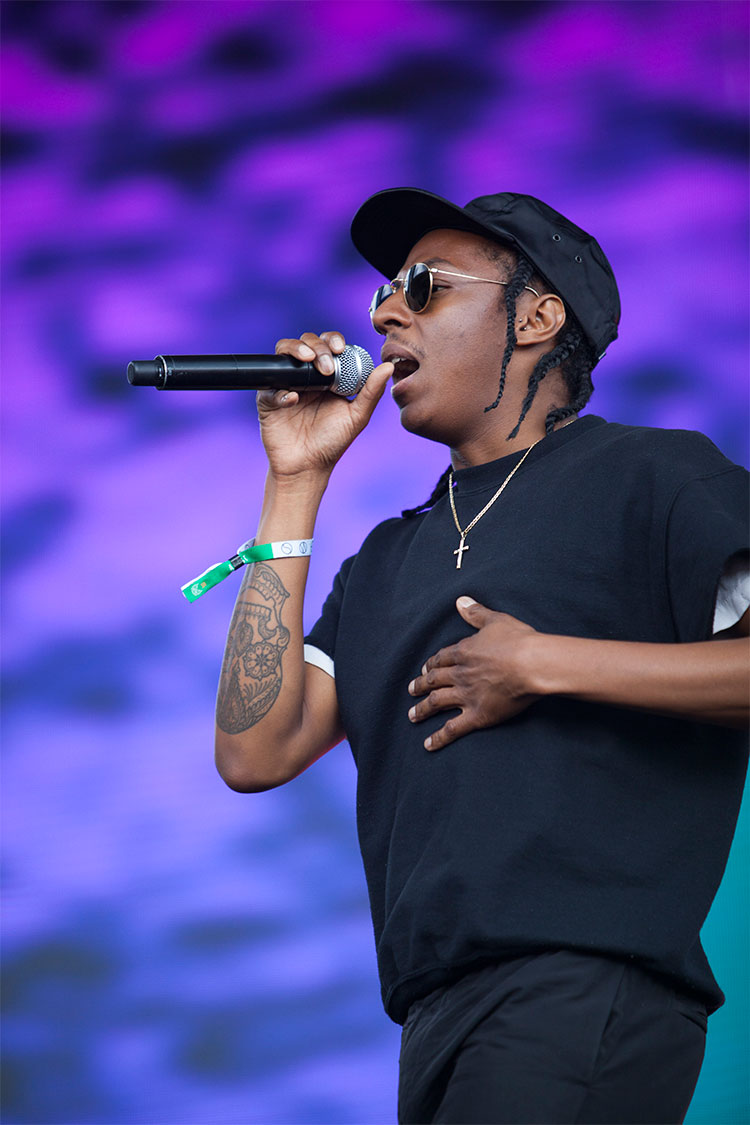
En route to grab a spot for the weekend’s second Mountain Man set, we heard a familiar voice emanating from the Decorum stage and rushed over to catch an impromptu drummer-less Field Report set. Frontman Chris Porterfield had appeared during the John Prine tribute for a fantastic rendition of “Unwed Feathers” with Anaïs Mitchell, but his band was curiously absent from the announced lineup. The small crowd that gathered got to hear a handful of songs from Field Report’s forthcoming third album in stripped-down but potent form, a good reminder that exploring the nooks and crannies away from the main stages is essential to getting the most out of Eaux Claires.
Mountain Man hadn’t performed publicly for several years prior to this festival, as Amelia Meath has been primarily focused on Sylvan Esso, but the group’s gorgeous harmonies sounded perfect from the lush, wooded Oxbeaux stage, where various birds contributed their own countermelodies. As an electronic drone rose up from Perfume Genius on the big stage, the folk trio closed their set with a defiant rendition of “Play It Right,” which had been notably absent from Sylvan’s set the night before, and their voices conquered the competing sound in the weekend’s most quietly triumphant moment.
As dark clouds once again began to blanket the grounds, the organizers issued a statement that set times on the main stages were getting scrunched up in anticipation of a potentially dangerous storm. Detroit rapper Danny Brown took the stage ahead of schedule and eschewed most of his dark, psycho material for a barrage of upbeat…but still mostly psycho party anthems. As the weekend’s fiercest storm sent most fans scurrying for whatever partial shelter they could find, Brown was relentless, and, amazingly enough, finished his set in a downpour that would’ve ended most festivals.
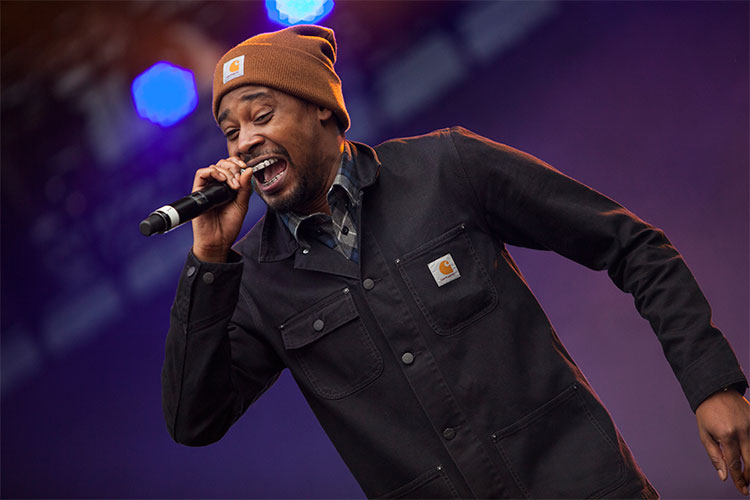
Sadly, weather concerns did cause the cancellation of all remaining side-stage performances (though some canceled performers reconvened at the Lismore Hotel downtown for an impromptu late-night hootenanny), so there was little to do as the rain let up except watch the crew squeegee the stage and check the equipment in preparation for Paul Simon’s set, the world debut of a collaboration with experimental chamber ensemble yMusic, a perennial Eaux Claires favorite. The set was partially as expected: impeccable arrangements of ballads like “America,” “Duncan,” and “That’s Where I Belong,” with yMusic tastefully accompanying Simon in the background. Then there was the unexpectedly rollicking cover of “Mystery Train,” not the sort of tune you’d expect to work well in a classical setting, but it did. Truly remarkable were renditions of “Peace Like A River,” “Mrs. Robinson,” and “Can’t Run But,” in which yMusic completely stole the spotlight, as well as in the somewhat unexpected Hearts And Bones nugget “Train In The Distance.” And even though the set ended with the one-billionth rendition of “The Sound Of Silence,” no one had ever heard a version like this; yMusic undeniably breathed new life into this relic, and tears flowed throughout the crowd.
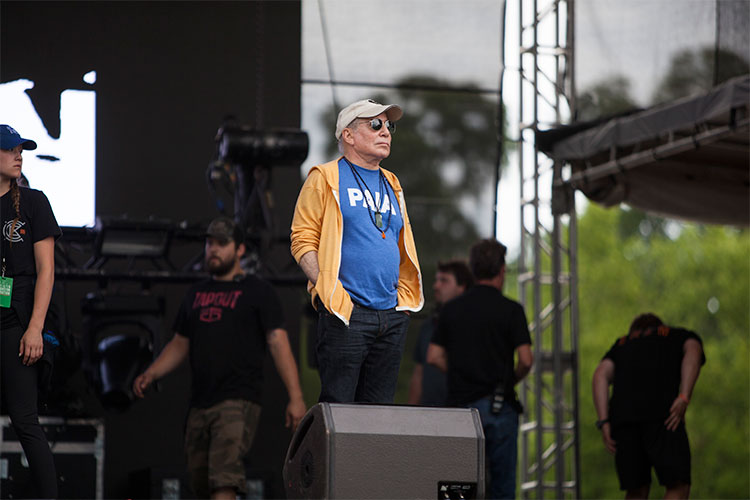
All that remained was to see if Wilco could complete its set before the next round of storms arrived. Despite having several potential collaborators in the festival lineup, Wilco stuck stubbornly to the relatively tight repertoire that’s been featured on its current tour, playing a completely safe, predictable set, almost as if in defiance of the Eaux Claires spirit. And yet, perhaps due to meteorological urgency, this wasn’t a typical Wilco set, exactly. Tweedy and company leaned on noisy, jammy tunes like “I Am Trying To Break Your Heart,” “Art Of Almost,” “Sunken Treasure,” and “Via Chicago,” and knocked every one out of the park. Perhaps owing in part to the magnificent sound system, newer songs like “Cry All Day” and “Locator” achieved full potency here, far beyond their relatively dull studio versions. All in all, the sheer energy of this set far exceeded the average Wilco show, and the band didn’t even have to finish early.
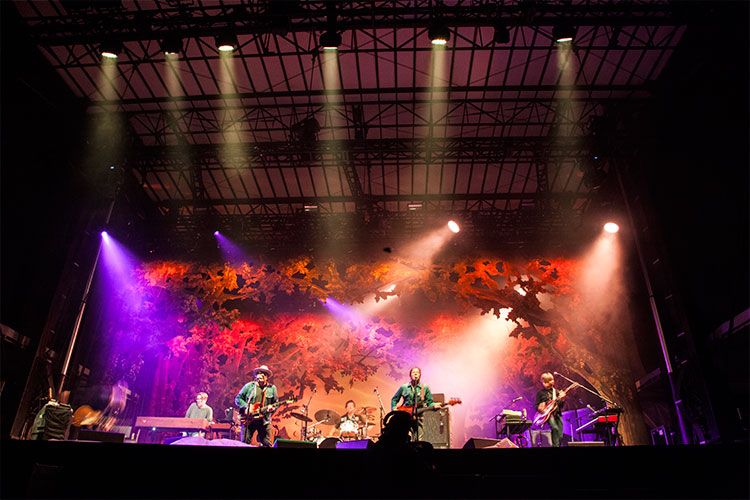
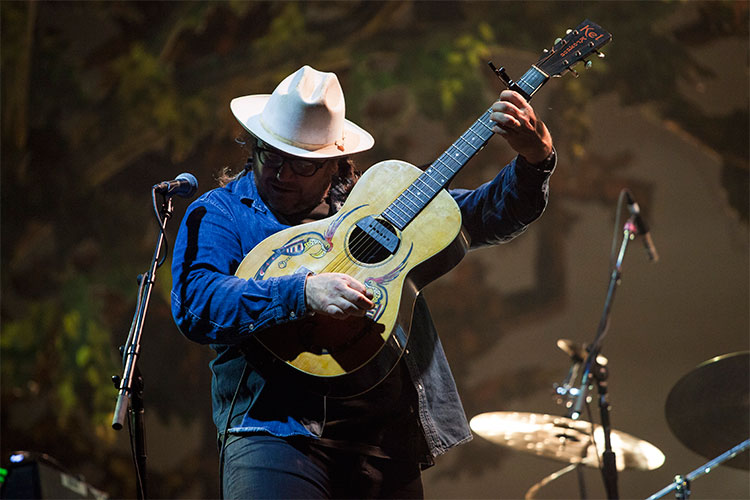
Troix definitely revealed some new developmental growing pains: the sound crossover issues; a somewhat disorganized shuttle system compared with previous years; a decline in food and beverage variety; and when you get down to it, musical variety as well. Aside from the strong hip-hop presence, the stylistic offerings were largely inner-circle and less adventurous than last year’s. In terms of music quality, though, Eaux Claires remains on top of the festival heap, and this transitional year only served to enhance the intrigue. Whatever Vernon and his co-conspirators might dream up for next year, anyone who’s been following along is unlikely to have lost faith.
